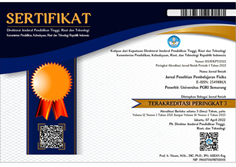Implementation PBL Model Assisted by E-Module Based on Refutation Text to Overcome Student Misconceptions on Dynamic Electricity Topics
DOI:
https://doi.org/10.26877/jp2f.v16i2.1716Keywords:
problem based learning, e-module, refutation text, misconceptionsAbstract
This research was conducted with the aim of addressing students' misconceptions in dynamic electricity topics through the application of the Problem Based Learning (PBL) model assisted by an e-module based on refutation text. The research design uses an experimental method, in the form of a pre-experimental design and a one-group pretest-posttest design, as well as the cluster random sampling technique. This research was conducted at SMP Negeri 2 Pontianak, with a research sample consisting of 31 ninth-grade students. The data collection instrument consisted of five items in the form of a two-tier multiple-choice test, and the results were categorized based on the combination of students' answers and justifications. The data obtained in the study were analyzed using normality tests and the Wilcoxon test, as well as effect size calculations using Cohen's formula as adopted by Glass. The research results show that the average misconception rate among students decreased from 43.2% to 14.9%, with an average misconception reduction of 28.3%, as evidenced by the Wilcoxon test results with an Asymp.Sig value of 0.000 (0.000 < 0.05), and an effect size calculation result of 3.14 (high category). This study proves that the application of the PBL model assisted by an e-module based on refutation text can overcome students' misconceptions in dynamic electricity topics with a high level of effectiveness.
References
[1] Daud M and Maulina P 2021 Penerapan Model Pembelajaran Think Pair Share dan Make A Match Untuk Meningkatkan Keterampilan Berpikir Kritis Siswa pada Materi Gerak Lurus Di SMA GRAVITASI: Jurnal Pendidikan Fisika dan Sains 4 18–22
[2] Mayasari Z A A T 2018 Profil kemampuan memecahkan masalah pelajaran fisika siswa MTs Seminar Nasional Quantum vol 25 pp 1511–2477
[3] Arviansyah R 2016 Pengaruh Model Pembelajaran Guided Inquiry Disertai Lks Audiovisual Terhadap Aktivitas Dan Hasil Belajar Ipa Siswa Di Smp Jurnal Pembelajaran Fisika 4 398–409
[4] Auli S, Diana N and Yuberti Y 2018 Analisis Miskonsepsi Siswa SMP pada Materi Fisika Indonesian Journal of Science and Mathematics Education 1 155–61
[5] Hidayatulloh M, Wiryokusumo I and Walujo D A 2019 Remidiasi miskonsepsi siswa pada materi listrik dinamis menggunakan ebook interaktif Jurnal Pendidikan Fisika dan Teknologi 5 30–9
[6] Minarni M, Kurniawan Y and Muliyani R 2018 Identifikasi kuantitas siswa yang miskonsepsi pada materi listik dinamis menggunakan Three Tier-Test (TTT) JIPF (Jurnal Ilmu Pendidikan Fisika) 3 38–41
[7] Alhinduan S R, Kurniawan Y and Mulyani R 2016 Identifikasi kuantitas siswa yang miskonsepsi menggunakan three tier-test pada materi listrik dinamis JIPF (Jurnal Ilmu Pendidikan Fisika) 1 29–31
[8] Wulandari D, Maison M and Kurniawan D A 2023 Identifikasi Pemahaman Konsep dan Kemampuan Berargumentasi Peserta Didik pada Pembelajaran Fisika Jurnal Pendidikan Mipa 13 93–9
[9] Syamsidah S and Hamidah H 2018 Buku model problem based learning (Yogyakarta: Deepublish)
[10] Imaningtyas C D, Karyanto P, Nurmiyati N and Asriani L 2016 Penerapan e-module berbasis problem based learning untuk meningkatkan literasi sains dan mengurangi miskonsepsi pada materi ekologi siswa kelas x mia 6 sman 1 karanganom tahun pelajaran 2014/2015 Bioedukasi: Jurnal Pendidikan Biologi 9 4–10
[11] Adi Y K and Oktaviani N M 2018 Konflik Kognitif dalam Perubahan Konseptual: Bagaimana dengan Refutation Text Seminar Nasional Pendidikan IPA Ke-X pp 161–8
[12] Cahyanto B and Afifulloh M 2020 Electronic Module (E-Module) Berbasis Component Display Theory (CDT) Untuk Matakuliah Pembelajaran Terpadu JINOTEP (Jurnal Inovasi Dan Teknologi Pembelajaran): Kajian Dan Riset Dalam Teknologi Pembelajaran 7 49–56
[13] Sugiyono 2019 Metode Penelitian Pendidikan (Bandung: Alfabeta)
[14] Yushintari D 2019 Pengaruh hypermedia terhadap miskonsepsi siswa pada konsep listrik dinamis
[15] Islami F H, Silitonga H T M and Hamdani H 2023 Efektivitas E-Module Berbasis Refutation Text Untuk Meremediasi Miskonsepsi Jurnal Inovasi Penelitian dan Pembelajaran Fisika 4 55–65
[16] Sutrisno L 2011 Ukuran Efektivitas (Pontianak)
[17] Herawati N S and Muhtadi A 2018 Pengembangan modul elektronik (e-modul) interaktif pada mata pelajaran Kimia kelas XI SMA Jurnal inovasi teknologi pendidikan 5 180–91
[18] Mariati M, Junaidi A and Napitupulu E 2023 Interaksi Refutation Text Dan Explanation Text Terhadap Miskonsepsi Mahasiswa LIABILITIES (JURNAL PENDIDIKAN AKUNTANSI) 6 1–9
[19] Sudiarto S P, Tandililing E and Oktavianty E 2018 Penggunaan Refutation Text on Prezi Untuk Meremediasi Miskonsepsi Siswa Pada Materi Suhu Dan Kalor Jurnal Pendidikan dan Pembelajaran Khatulistiwa (JPPK) 7
[20] Ferrero M, Hardwicke T E, Konstantinidis E and Vadillo M A 2020 The effectiveness of refutation texts to correct misconceptions among educators. J Exp Psychol Appl 26 411
[21] Asterhan C S C and Resnick M S 2020 Refutation texts and argumentation for conceptual change: A winning or a redundant combination? Learn Instr 65 101265
[22] Ferrero M, Konstantinidis E and Vadillo M A 2020 An attempt to correct erroneous ideas among teacher education students: The effectiveness of refutation texts Front Psychol 11 577738
[23] Hikmawati F 2020 Metodologi penelitian (Depok: Rajawali Press)
[24] Khoiruddin M 2017 Remediasi Miskonsepsi Siswa Menggunakan Strategi Metakognitif Berbantuan Refutation Text Pada Materi Gerak Parabola Jurnal Pendidikan dan Pembelajaran Khatulistiwa (JPPK) 6
[25] Olaogun O P and Hunsu N J 2025 A systematic review of factors that predict and mediate conceptual change European Journal of Psychology of Education 40 1–25





